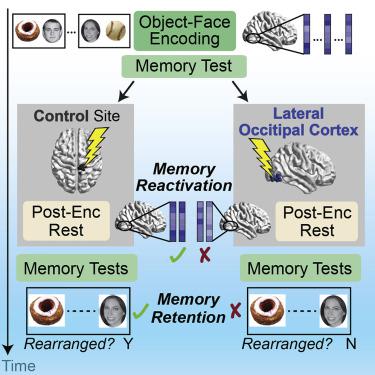Current Biology ( IF 8.1 ) Pub Date : 2020-07-30 , DOI: 10.1016/j.cub.2020.06.063 Arielle Tambini 1 , Mark D'Esposito 2

|
Stable representations of past experience are thought to depend on processes that unfold after events are initially encoded into memory. Post-encoding reactivation and hippocampal-cortical interactions are leading candidate mechanisms thought to support memory retention and stabilization across hippocampal-cortical networks. Although putative consolidation mechanisms have been observed during sleep and periods of awake rest, the direct causal contribution of awake consolidation mechanisms to later behavior is unclear, especially in humans. Moreover, it has been argued that observations of putative consolidation processes are epiphenomenal and not causally important, yet there are few tools to test the functional contribution of these mechanisms in humans. Here, we combined transcranial magnetic stimulation (TMS) and fMRI to test the role of awake consolidation processes by targeting hippocampal interactions with lateral occipital cortex (LOC). We applied theta-burst TMS to LOC (and a control site) to interfere with an extended window (approximately 30–50 min) after memory encoding. Behaviorally, post-encoding TMS to LOC selectively impaired associative memory retention compared to multiple control conditions. In the control TMS condition, we replicated prior reports of post-encoding reactivation and memory-related hippocampal-LOC interactions during periods of awake rest using fMRI. However, post-encoding LOC TMS reduced these processes, such that post-encoding reactivation in LOC and memory-related hippocampal-LOC functional connectivity were no longer present. By targeting and manipulating post-encoding neural processes, these findings highlight the direct contribution of awake time periods to episodic memory consolidation. This combined TMS-fMRI approach provides an opportunity for causal manipulations of human memory consolidation.
中文翻译:

清醒后编码过程对情节记忆巩固的因果贡献。
过去经验的稳定表征被认为依赖于在事件最初被编码到记忆中之后展开的过程。编码后重新激活和海马-皮层相互作用是被认为支持跨海马-皮层网络的记忆保持和稳定的主要候选机制。尽管在睡眠和清醒休息期间观察到了推定的巩固机制,但清醒巩固机制对以后行为的直接因果贡献尚不清楚,尤其是在人类中。此外,有人认为,对假定的巩固过程的观察是附带现象,并不具有因果关系,但很少有工具可以测试这些机制对人类的功能贡献。这里,我们结合经颅磁刺激 (TMS) 和 fMRI,通过靶向海马与外侧枕叶皮层 (LOC) 的相互作用来测试清醒巩固过程的作用。我们将 theta-burst TMS 应用于 LOC(和一个控制站点)以干扰记忆编码后的扩展窗口(大约 30-50 分钟)。在行为上,与多种控制条件相比,将 TMS 编码为 LOC 后选择性地损害了联想记忆保留。在控制 TMS 条件下,我们使用 fMRI 在清醒休息期间复制了编码后重新激活和与记忆相关的海马-LOC 相互作用的先前报告。然而,编码后 LOC TMS 减少了这些过程,使得 LOC 中的编码后重新激活和与记忆相关的海马-LOC 功能连接不再存在。通过靶向和操纵编码后的神经过程,这些发现突出了清醒时间段对情景记忆巩固的直接贡献。这种组合的 TMS-fMRI 方法为人类记忆巩固的因果操作提供了机会。











































 京公网安备 11010802027423号
京公网安备 11010802027423号